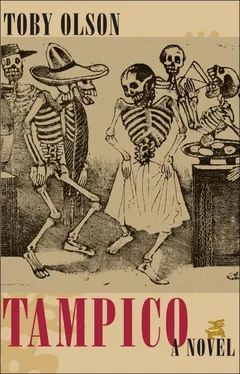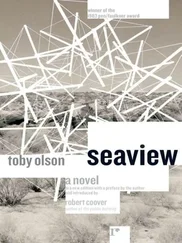Mother touched my arm, and I saw the purse clutched at her chest, then turned to see the woman step out beyond the trellis, the face of a skeleton, but smiling, her hand up and gesturing.
“English?” she said. “French? German?”
I answered, and she spoke again.
“Come in! Come in out of the heat!”
The room was dark and cool, and she brought iced tea and cookies and small folded rags on the tray beside the pitcher so we could wipe our brows, and breeze lifted the hanging cloths in the window frames, and the rugs on the bleached wooden floor shone in their subtle earth-tone colors as stripes of light came in. We sat in white wicker, around a wooden table, and there were pictures of mountain snow scenes on the wall behind her and a military uniform dripping with medals on a hanger hung from a nail, displayed like a picture, and flowers in stone pots sat on tables and wood pedestals below the pictures and in earthenware vessels on the floor in the corners of the room. The blond table was waxed, and my mother’s purse sat at the corner as on a mirror, and the woman glanced at it, and when my mother mentioned the names we’d come with, the woman smiled faintly, then turned toward the cloth window, the skin at her cheek like parchment, and sighed, and then turned back to us, and when she spoke her voice was thin and steady and I heard a faint echo, as if her skull were an empty chamber.
“But they’re gone,” she said, “my brothers. There’s nothing anymore. Just that.” She glanced over her shoulder at the uniform. “And a few trinkets and documents. Like any family. Now you tell me of Roberto, and he too is gone, and now there is only me.”
“Roberto,” my mother said. “From fishing. A hard life.”
“My father,” I said.
“Yes, my dear. And I am your aunt.” She looked at my mother. “But I have been gone, you see, since the early ’30s, when I was seventeen. To Europe for my study. Then for a life. I just recently returned, two years ago. I came back to die here in Chorreras. This is my home.”
“Are you ill?” my mother said. “Is there anything we can do? Can we give you money?”
She was looking at the purse, wanting rid of it I thought, to be done with the whole thing finally, to be rid of my father.
“Oh, my, no!” the woman said. “I’m very healthy I think. I didn’t mean soon. I meant I’ll stay here until then. I have all the money in the world.”
There was a full bookcase on the wall and I saw the edge of another through a doorway. Books sat on tables beside plants, and there was a stack of them on the floor beside a lamp and chair.
“Reading,” I said. “And not fishing.”
She laughed lightly, her lips pulled back to the gums, buck teeth protruding. I heard a click as her mouth closed and her eyes blinked, saw her brow wrinkle in puzzlement.
“You keep mentioning that. Fishing. But I don’t understand.”
“Well, the family,” my mother said.
“And my father,” I said.
“This is a fishing village. But this is a summer place, one of many, but the best one I think. Did you see the view?”
We hadn’t turned to look, and she got up and moved to the window and lifted her arm to usher us over, and then she pulled the cloth aside, and we could see the village far below, the church steeple and the huts and boats on the beach and the white stone of the rocky shoreline for miles to either side and the grand expanse of the blue gulf opening out in sun to the far horizon.
“I don’t understand,” my mother said.
We were seated again, and the woman poured tea and passed the plate of cookies. She’d left the room, and we’d heard a drawer opening in the distance, then she came back carrying a wooden box, scrolls of thick paper with colored ribbons dangling from them sticking up at the top. She’d placed the box on the table beside the purse, then poured the tea, then leaned back in her chair.
“Those are documents,” she said. “Contracts and deeds, and some of them are yours now. Did you know your father had another name then, what you call a nickname?”
“I never heard of that,” my mother said.
“Yes,” she said. “Calaca. He was called that. Because of his bony face. He was a soldier in General Corzo’s army. There was trouble and he left for the north then. But then the general died, and my brother Dagoberto became general. That is his uniform. There was no fishing.”
“A soldier,” my mother said.
“Yes. Unofficially. It was tribute. These documents. It was oil then, and a revolution against the constitution. There were many generals.”
I could see my mother’s face harden in the face of my father’s lies, a new one now, but a last one for her. They could keep coming as far as she was concerned. Her look drew a final line against him, and all she seemed to want now was to be out of there, to leave the money and go. But the woman who was my aunt didn’t want the money, didn’t need it. They both looked at the purse for a long moment, then I interrupted the silence, still needing more.
“And the reason?” I said.
She didn’t hesitate.
“It was a killing. A man of some distinction, but a soldier too. An insult as I remember. Your father Roberto, Calaca, he had to leave.”
I looked at my mother, but she was silent, already on her way back to America.
“But there was another too,” I said. “Another brother?”
“Yes,” she said. “And another nickname. Of a woman. He was called Sosa, a translator, business manager for General Corzo. And later, for our brother Dagoberto as general, he continued. My three brothers. Did he die in peace?”
“Yes,” I said. “In his sleep.”
“That’s good.”
“But he left none for us,” my mother said as she rose from her chair, her voice like a remnant.
I held the purse under my arm as we walked back to the boat, and my mother held her hands tight at her waist at the rail as we chugged up the Panuco toward Tampico. I still have the pesos, in the purse, in a box in the basement. I sold the documents my aunt gave us, something arranged for me by Arthur, after my mother died, and I still have the memory of my mother raising her hand in the hotel dining room as I began to speak. We finished eating in silence, then went up to our rooms, and the next morning we were shopping in rain. She was focused and insistent as she selected clothing and trinkets, and there was no room for talk of other things. Then she was stepping out from the curb and the bus was coming and I was calling out to her, and my umbrella was blowing away in rain in the muddy street.
Water’s been leaking in and we can’t find the source. All the pipes are exposed, up between the basement ceiling joists, and Arthur has checked the pump seals and the prime. It’s pooled on the dirt floor in the morning, and only by noon has it leached down into clay. Arthur has checked the toilet and the shower, the kitchen sink, and the stone walls are dry. Sometimes it isn’t there at all. It comes in with the dampness and after rain, and I don’t know. I’ve managed to get down to the wine cellar, with difficulty. There’s rubble in the passage now, another cave-in, but the rocks and fallen earth are dry enough and that can’t be it, and Arthur’s found nothing at the foundation. He’s trying to shore it up, a cement and sand mix where the earth has shifted, but I can’t go out there now to watch him. When I think of the rope tether, the edge of panic rises, even just glancing through the window, and I’ve pulled the shades down on that side, and I look down at my feet as I walk to the limousine in my dark glasses. My bettas are gone and the windy weather is feely, and Arthur holds my arm, and I’ve been closing the curtains tight on our way across the meadow to the Manor. I think there is no hope for it at all, and I think I feel the house move under me in the night.
Читать дальше












